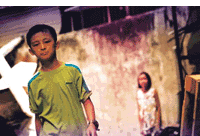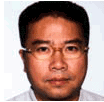 |
|
 |
 |
 |
 |
 |
 |
 |
 |
 |
 |
 |
 |
 |
1999 / Hong Kong-Japan / Color / 115min.
* 2000 Locarno International Film Festival Silbar Leopard and C.I.C.A.E. Award Special Mention |
 |
|
 |
[SYNOPSIS]
A nine year old boy, Cheung helps out in his father's eatery after school.
He can take calls and also deliver take out orders. He delivers to the neighborhood mahjong gamblers, funeral shops and even brothels. Cheung has a very kind grandmother who stays in the house all day long. A Filipina maid, Armi, looks after her.
Cheung actually has an older brother, Hang, who strayed over to the wrong side of the tracks and joined the underworld years ago. Their father had chased him out of the house.
Cheung befriends a girl of his age, Fan. She also helps out her family a great deal. The two hang around doing things like making deliveries in exchange for a small pocket money, or riding around the town on a bicycle while taking Fan's little sister along. But for some reason unknown Fan does not go to school and is petrified at the mere sight of policemen.
One day, Cheung borrows an old photograph of his older brother, Hang, from his grandmother and takes it around the neighborhood inquiring of the senior neighbors his whereabouts. When his father finds out about it he punishes Cheung harshly. Feeling that he was unjustly punished, Cheung runs away, but father eventually finds out from Fan where he is hiding.
Incensed that Fan should have snitched, or so he believed, Little Cheung ignores her from then on.
Then his grandmother passes away and gone is Armi whom Cheung used to adore more than he ever did his real mother. Moreover, Fan's family is arrested for being illegal immigrants; they are being deported back to the Mainland China. Cheung desperately chases after the police car, but then from one point on he starts running after an ambulance instead...
[COMMENTARY]
Fruit Chan's LITTLE CHEUNG unfolds against the backdrop of downtown Hong Kong. Through the eyes of a nine year-old boy, who helps out his parents in a tiny eatery, we see life in Hong Kong before Britain's hand-over to China. While delivering food for his parents' shop, Little Cheung catches glimpses of the lives of many people: illegal immigrants, policemen, the manager of a funeral shop. Some customers try to postpone paying for the food, while others demand to put the bill on credit. Some evade paying at all. All of these interactions reveal that Little Cheung lives on the shady side of the town. Although the film suggests that Cheung's older brother Hang bolted from the prospect of a dismal life owning a shabby eatery, thereby betraying his father's expectations, his reasons for joining the underworld are never clearly explained.
As July 1, 1997, the fateful day of hand-over approached, young people disaffected by despair over their futures, increasingly joined the underworld. Many of them killed themselves in a rash of self-destructive behavior. This prompted Fruit Chan to shoot MADE IN HONG KONG, a movie about three suicidal teenagers: Chau, Long, and Ping. Hong Kong residents anxious about the hand-over and what might lie ahead, immediately identified with the three young characters, living only for the moment.
Their support for the film helped make it Hong Kong's film of the year in 1997. Fruit Chan shot the sequel THE LONGEST SUMMER, the following year. It portrays middle-aged ex-soldiers of the British Royal Army abandoned by society. The stories of how they seek employment in the underworld is told with dark, biting humor. LITTLE CHEUNG concludes Chan's trilogy, featuring the monumental moment in history. Each film presents the hand-over from a different perspective while they all share scenes of the spectacular fire works. In the last scene of LITTLE CHEUNG , we see Chau and Long from MADE IN HONG KONG walk beside Ping, now pregnant. Ping's round belly symbolizes hope, in sharp contrast to the tragic outcome of MADE IN HONG KONG.
Fruit Chan says, "I wanted to make films that people could look back on one hundred years from now as realistic historical records." This vision inspired him to cast regular people rather than professionals. He flatly stated he would not shoot LITTLE CHEUNG unless he found a boy exactly right for the lead. "Children in Hong Kong have seen too much and they have the same look in their eyes as adults. I want a child with innocent eyes." Thus the search for little Cheung dragged on until they finally found Yui Yuet Ming playing on the streets of downtown Hong Kong. He had just moved from mainland China and didn't speak fluent Cantonese. The search for Little Cheung is evocative of what has been lost to the children of Hong Kong.
Lastly, who is Xin Na Shizeng whom everyone at the eatery loves watching on TV everyday and whom Little Cheung's grandmother adores? Born in 1916, this popular actor performed in nearly 300 films since his debut in 1936. When he fell ill in 1997, his wife and son fought an ugly public battle over his money. The scandal, which was reported on television, shocked his fans. The man had worked hard to attain wealth. He had lived a long life, and now he was watching his family disintegrate over the very wealth he had devoted his life to. His pathetic figure must have left the money-conscious people of Hong Kong with a bitter after taste. Xin Ma Shizeng passed away before he had the chance to witness the hand-over, which also left the people in Hong Kong with food for thought regarding their outlook on life. |
 |
by Yuka KINBARA
|
The Message from the director :
Witnessing the 1997 hand over of Hong Kong back to China was the monumental moment in my life as I felt my emotion violently shaken. I was inspired by this historical event and had an urge to express this deep passion inside me. Thus MADE IN HONG KONG was made, in which I revealed my feelings to the audience through the world of the hopeless young generation in Hong Kong. The next movie on line is THE LONGEST SUMMER, in which I signified my emotion through the sorrow of a group of middle-aged men who had to learn to cope with the new system. Finally, my third work, LITTLE CHEUNG exhibits how the changes of an era affect the families of Hong Kong through the eyes of a nine years old boy. |
 |
 |
 |
 |
|
Fruit Chan, director :
Born in Hainan Island, Guangdong, China in 1959. He migrated to Hong Kong with his parents at the age of five. He kept over ten jobs before he finally discovered filmmaking in the 80's and joined Hong Kong Film Culture Center, founded by Tsui Hark, Ann Hui and Yim Ho to study script writing and directing. In 1982, he became an assistant director at Century Film Production until he moved on to Golden Harvest where he worked as an assistant director and production coordinator. In 1992 he made his first budget feature film FINAL IN BLOOD using the film set that had been set up for other film, FAREWELL, MY LOVE; it was to be directed by Tony Au but its shooting had been postponed, which provided Fruit Chan with an opportunity. In 1994, he started working on his script, MADE IN HONG KONG and stocking up scratch footage of film that had been dropped from all the movies he had been involved. Shooting of MADE IN HONG KONG started in 1996 and was completed in 1997. It was a box-office hit and the lead actor Sam Lee, a talent discovered on the street, became a star overnight. In 1998, his THE LONGEST SUMMER was screened.
Staff :
Director / Screenwriter : Fruit Chan
Executive Producer : Doris Yang, Makoto Ueda (NHK)
Associate Producer : Keiko Iino(NHK ENTERPRISES 21,INC)
Director of Photography : Lam Wah Chuen
Prodction Designer : Chris Wong
Cosutume Designer : William Fung
Music : Lam Wah Chuen, Chu Hing Cheung
Cast :
Cheung : Yiu Yuet Ming
Fan : Mak Wai Fan
Man : Mak Yuet Man
Mr.Kin : Gary Lai
David : Robby
|
|
|





